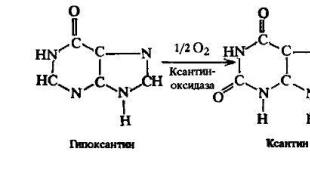Spelling "because". Spelling of the union "because": grammar, semantics, punctuation, synonyms When a comma is placed with the union because
BECAUSE or BECAUSE
(comma for complex subordinating conjunctions)
In the language, unlike arithmetic, from the rearrangement of the places of terms, the sum not only changes, but can sometimes turn into a difference.
Perhaps best of all, this property of our written language is demonstrated by two popular "punctuation anecdotes". The first of them is about the loser Vita Perestukin, the hero of L. Geraskina's story "In the Land of Unlearned Lessons", whose fate turned out to be dependent on how he puts a comma in the sentence passed on him by His Majesty the Imperative Verb "for ignorance, laziness and ignorance mother tongue": EXECUTE SHOULD NOT BE PARTY. And the second is about a certain traveler who, at the moment of danger, promised in case of salvation " put up a golden statue holding a pike
", but as soon as the danger passed, he decided not to fork out and gave the order: " Set up a statue holding a golden lance
".
Russian punctuation, according to the remark of one of its most subtle researchers N.S. Valgina, "has a clear purpose - to convey to the reader the meaning of what is written as it is reproduced by the writer." That is why it is by its very definition subjective, and therefore - and this is its fundamental difference from spelling - in most cases with the need for variation. And it is absolutely necessary to remember this when studying the system of punctuation rules: after all, according to A.P. Chekhov, "in a work of art, signs often play the role of notes, and it is impossible to learn them from a textbook; you need flair and experience."
Try to find punctuation errors in the following sentences and understand how incorrect punctuation breaks the meaning of the text:
1. It has long been established that octopuses are excellent learners, they have a good memory, they recognize the people who feed them and can become tame.
2. Anton shed a tear when he saw him, bowed to the ground, told him that his old master was still alive and ran to harness the horses (A. Pushkin).
3. She [Anna Sergeevna] walked alone, all in the same beret with a white spitz (A. Chekhov).
4. With the Earth, I maintained two-way radio communication and heard the voices of comrades who worked at radio stations as clearly as if they were nearby (According to Yu. Gagarin).
5. Suddenly the coachman began to look away and, finally taking off his hat, turned to me and said: "Master, would you order me to come back?" (A. Pushkin).
6. Unfortunately, he was extremely myopic so that he even wore glasses on some special order (A. Kuprin).
7. On the lower floor, under the balcony, the windows were probably open because women's voices and laughter were clearly heard (A. Chekhov).
The last two examples illustrate the rule about punctuation in a complex sentence with a compound subordinating conjunction ( due to the fact that, in view of the fact that, due to the fact that, because, instead of, in order to, while, because, because, despite the fact that, after, before like before
etc.).
If the subordinate clause is connected to the main one with the help of a complex (compound) subordinating union, then the place of the punctuation mark is often determined by the writer himself - depending on the specific goals of the statement. You can write He liked herbecause
was very beautiful(emphasis on results) or She liked himbecausewas very beautiful(emphasis on cause).
When the union is dismembered, its first part becomes a correlative word included in the main part of the complex sentence as one of its members (as a rule, circumstances), and the subordinate clause acquires a clarifying character: Her face was subtly rosy and slightly glossy.(for what reason?) because(why exactly?) , what(M. Sholokhov). (Compare her face<…>glossy (for what reason?), because ofshe recently washed her face with soap.)
However, there are formal conditions, dictating the mandatory dismemberment / non-membership of such a union. The conditions for the mandatory dismemberment of the union include the following:
The presence of a negative particle "not" before the union, for example: She liked himnot becausewas very beautiful.
The presence of amplifying, restrictive and other particles before the union, for example: She liked himonly (only, in particular, especially etc.) because was very beautiful.
The presence of an introductory word or an introductory construction before the union, for example: He liked herapparently (probably, maybe, it seems, obviously, I think, I suppose etc.) , becausewas very beautiful.
Inclusion of the first part (correlative word) in a series homogeneous members or parallel constructs, for example: She liked himbecausewas very beautifuland even more because had an extraordinary charm.
It must be borne in mind that some unions, when broken into two parts, change their meaning dramatically, for example: I fell, so broke my knee (subordinate consequence) - I fell sobroke my knee(subordinate modus operandi with a hint of the degree of this quality); He looked at herbecausehe liked her(subordinate reason) - He looked at herbecauseif he liked her(subordinate modus operandi with a hint of the degree of this quality).
More often, a complex subordinating union is not divided if the subordinate clause precedes the main one, for example: As
the snow in the pot turned gray and turned into a milky cloudy liquid, Pavel added snow from a bucket(B. Okudzhava). The undividedness of the union in such a position is explained by the fact that the last part of the sentence is usually accentuated, while accents are rare at the beginning. Wed: Asthe sun was rising, the day was warm and cheerful(I. Bunin). - Noise subsided as
the news penetrated all corners of the hall(L. Leonov).
Complex unions are not dismembered while, while
: He liked to read detective storieswhile
(whereas) his wife preferred the romance genre.
The possibility of dismembering the union while is detected when the temporal meaning is updated, especially when words are included just, still, most, precisely
: I asked my grandfather about itjust at the time when
he swung it was the second boots(M. Prishvin). Such sentences are close to sentences with the union when (during the time when
): Mushrooms are really starting to growduring the time when
rye sweeps an ear(V. Tendryakov).
In the story of A. Kanevsky "On the benefits of punctuation marks" it is said how " a person lost a comma, became afraid of complex sentences. I was looking for a better phrase. For simple phrases came simple thoughts.
Then he lost the exclamation point and began to speak quietly, with one intonation. Nothing pleased or revolted him, he treated everything without emotions.
Then he lost the question mark and stopped asking any questions. No events aroused his curiosity, no matter where they happened - in space, on Earth, or even in his own apartment.
After a couple of years, he lost his colon and stopped explaining his actions to people.
By the end of his life, he was left with only quotation marks. He did not express a single idea of his own, he always quoted someone - so he completely forgot how to think and reached the point.
Watch out for punctuation marks!"
Russian language
How to put a comma with the union "because"?
2 comments
Understanding how to correctly put a comma in the union “because” is easy. There is a misconception that a comma will always be inserted before “what”, this is not so, there are exceptions.
It is unreasonable to repeat other people's mistakes, you need to understand the designs. There is no comma after the union "because" and the rules do not mention this.
Comma in conjunction "because"
It is placed before the word and therefore in the middle between words, but certain conditions must be met for this. Which the main idea suggestions?
What should the reader understand first?
When we pronounce words, we pause and use intonation to express all punctuation marks. In oral speech, we do not think about how to pause, they are formed on an intuitive level.
Written speech is devoid of emotional outbursts and signs help to correctly determine the mood or essence of the spoken phrase. They affect people's perception of information. With the help of signs, you can understand how the author wants to convey his emotions to us in the text.
comma before because
Putting a comma in the right place will not change the essence of the sentence.
- He was walking along the road and stumbled because he did not see a large stone.
Here is the reason: he stumbled because he did not see.
- He was walking along the road and stumbled because his legs were tired and the pavement was occupied by a car.
In the second sentence, we confirm the action: stumbled due to tired legs. If we put a comma before "Because", then the essence of the sentence would change.
If you compose sentences in such a way that you want to explain the first action of the sentence with a participial turnover, then a comma is put after that.
- He went outside for a walk because his head needed fresh air.
- We are walking on this bridge because it was recently repaired.
- Marina is dancing because she does not see herself in another profession.
Now let's look at examples of sentences that are exactly the same, but punctuation marks can be put in different places. And the essence of the proposals will change dramatically.
Example 2
- She loved him because he was always there for her.
- She loved him because he was always there.
Commas placed in different places in the same sentences change its essence. In the first option, it is appropriate to ask the question, why did the girl love the guy?
He was always there. In the second case, it is said that the girl loved, and the main emphasis is done on the fact of the existence of love, but for what, is already of secondary importance.
After reviewing several examples, we found out that a comma can be placed in different places depending on the essence of the sentence.
Where is the comma placed in the conjunction "because"?
In the rules, we put a comma after the word because, and various particles are added, and a sign is placed before because.
- Particle "Not" before "because":
She loved him not because he was handsome and smart. - Before "Because" introductory words or participles, separated by commas on both sides:
He was walking along the road and stumbled, as it turned out, because he did not look at the road.
As it turned out - an introductory design. - “What” is preceded by a comma in the “because” construction, if a special clarifying particle is added before the union, which creates a restrictive or expressive character of the sentence.
He was walking down the road and only stumbled because the sidewalk was occupied by a parked car.
Just a clarifying particle. - If the sentence has several homogeneous members, then after "because" a comma must be placed.
She loved the guy because he was brave, and also because he was handsome and smart.
In all the above 4 cases, A comma must be placed before "what".
If an action is expressed, then it is followed by an explanation of the reason for this action, then a comma is most often placed before the “because” construction.
So we looked at a few examples that will help you better understand the popular union. You can also get acquainted with the.
Like many derivative service parts of speech, the word “because” raises many questions: is a comma needed, where is it placed, if necessary (before or after “because”), is the word “because” distinguished by commas on both sides. To answer these questions, we must turn to the meaning of the union in this sentence.
"Because" is separated by commas
Before a phrase
The word "because" is a subordinating conjunction, it connects parts of a complex sentence: it attaches a subordinate clause of the cause. So the answer to the question, before "because" is a comma or not, is obvious. Of course, a comma is needed before “because” if the whole combination is a union. It can be replaced by the synonymous conjunction "because".
- We could not even move, because the dried leaves rustled loudly from our movements.
- Now it is pointless to talk about it, because nothing can be changed anyway.
After the word "because"
However, it is important to determine where to put commas, because this combination can be separated by a comma in some cases.
1. A comma is placed after "because" if there is a negative particle "not" before it.
- I didn't do this because I don't love you.
- He didn't go to the party not because he didn't want to.
2. The sign appears after “because”, if there are any reinforcing or restrictive words: “only”, “precisely”, “perhaps”, etc.
4. Finally, a comma after "because" is placed if the sentence contains a list of reasons.
Many people have various difficulties with the use of the Russian language in speech and writing. The question of how to spell "because" is one of the most common confusions.
This union is very common in speech, and perhaps that is why they make especially many mistakes in it. They can turn out to be both spelling and punctuation (where exactly a comma is needed here can be difficult to decide). Let's figure out how to write "because" correctly, and clarify where to put commas.
When the union is applied: main cases
How it is written and how this combination is applied is a rather complicated question. Let's start by defining the part of speech.
Before us is a complex (or composite) union. He usually connects two sentences into one, and thanks to him we can understand the reason for what is happening. As a rule, it occurs in complex sentences. These syntactic constructions consist of several parts - the main and one or more subordinates.
Spelling "because"
The named union consists of two words that contain 5 consonants (p, t, m, h, t) and 4 vowels (o, o, y, o). The first word consists of three syllables, where the stress falls on the last of them, the second - from one. In the first word, the letter "o" is written in both unstressed syllables.

How do you spell "because" - together or separately?
Now we will figure out how to write “because”: together, separately, or maybe with a hyphen?
The words that make up this union are always written separately. There can be no continuous spelling, since these are two different words. A common mistake is when they are written with a hyphen. Obviously, this is caused, first of all, by the similarity of the word “what” with the particle “-something”, which is written with a hyphen (an example here is the word “because”).
To avoid such a mistake, compare the two sentences in the example above. Please note that these words in them have slightly different meanings:
- Last year I got sick with bronchitis. That's why I quit smoking.
- I quit smoking last year because I got bronchitis.
When is "by that" written separately?
For many, “because” and “because” are similar words, although in meaning this is far from being the case. They have completely different meanings. In the first case, the sentence refers to those specific items or specific traits on which the emphasis is placed. For instance:
- I immediately concluded that the girl was not rich. It was noticeable by what she wore.
In this case, those things (clothes) that the girl wore were mentioned. That is, by clothes, the observer can tell how well-off a girl is. There is no reason here, but objects are mentioned.
One more example:
- A person's preferences can be inferred from what he buys.
This sentence can be rephrased as follows - according to the things that a person buys, one can draw a conclusion about his preferences.
In the second case (when “because” is written together), the reason for some event is revealed. That is, you can ask the question "why?" and immediately answer it. In this case, the union can be successfully replaced with synonyms “due to”, “because”, “because”, “after all” and others. For instance:
- I left work early because I felt unwell.
In this case, the phrase will look quite organic when replacing the conjunction “because” with another one: I left work because I didn't feel well.
One more example:
- I don't have money because I spent it.
This phrase does not change its meaning when the union is replaced by the word "because": I don't have money because I spent it.
Punctuation

The greatest difficulty is the question of the use of punctuation in sentences with this union. Usually a comma is placed before it. For instance:
- I don't know where he went because he didn't tell me about it..
Here you can ask the question: "Because of what I do not know where he went?". And answer him: “Because he didn’t tell me.” That is, we have two sentences that are combined into one by a subordinating union.
- We got very wet because we got caught in the rain(What caused us to get wet? The reason was the rain.)
- I don't have a phone because it was stolen(Why don't I have a phone? Because it was stolen).
There are cases when a comma is placed before the second word of the union and is not placed before "because":
- With a meaning-enhancing particle (e.g. "only"): I liked him only because he treated me with great tenderness.
- With an introductory word such as "probably", "should", "probably": They didn't come, probably because they were very busy.We never met, probably because he left before me.
- With a particle of negation "not" before the union: I'm not late because I got stuck in traffic.
Outcome
The Russian language is rather complicated in terms of spelling and punctuation, but this does not at all justify, for example, the execution of documents with errors.

So, every self-respecting person should strive to speak and write correctly. This article hopefully helps you. For convenience, we will list again how to spell "because" correctly:
- The named union is always written separately.
- A comma can be placed both before and inside it.
- The words “because” and “because of that” have different meanings and are spelled differently.
This is a fairly common phrase used to explain causes or phenomena. “Because” is, at first glance, a very simple expression. Moreover, it is replaced by other particles:
- because;
- because of that;
- due to.
These phrases help diversify your speech and make it more flexible. But there are cases when the use of this union cannot be avoided. The only way to always write it correctly, with proper punctuation marks, is to fully study the origin, rules, and spellings. This approach will help build complex sentences, and will make written, as well as oral speech more educated and literate.
“Because” together or separately?
This phrase is a compound union and a set expression. Many are wondering how to spell “because” together or separately? The most common mistake is to write this expression together. This is contrary to the rules of the Russian language. A hyphen between phrases and variations like “because” are not allowed.
"Because" connects the main and subordinate parts of the sentence. To check spelling, a question is asked to the subordinate part. She must answer the question why. If posing such a question is logically possible, two-word spelling should be used (i.e. because). In situations where the formulation of such a question is impossible, the expression is written in three words (ie, by the fact that). In the second situation, this phrase is no longer a complex union, but a combination of a preposition and a pronoun, as well as the union what.
Because the comma and spelling
Separating the union with punctuation marks raises many questions. A comma before because can be placed either before a phrase or inside it, dividing the union into two parts. It is mainly used to link the main and subordinate parts in a sentence. For instance:
- "She doesn't eat fried food just because she's healthy."
The main spelling problem is the correct placement of commas. The distribution of commas determines what the author focuses on. The emphasis may be on the result or the cause. Examples:
- “He beat me because he trained more” (emphasis on the result);
- “I don't like cats because I'm allergic to them” (emphasis on the cause).
The desire to write because with a hyphen arises from the similarity of pronunciation with the particle that is written with a hyphen with pronouns and adverbs. But because it is a compound union and does not require a hyphen between parts of the expression.
The division of the union leads to a scatter of its components in different parts of the sentence. “Because” usually leaves the main part of the sentence, and “what” - the subordinate one.
When dividing the union, therefore, it is included in the main part of compound sentences. This is verified by asking a question. If the subordinate part answers the questions why or for what reason. Example:
- “He started coughing and choking because he left his inhaler at home” (For what reason?);
- “The girl didn’t go to the theater with him because he doesn’t take care of himself” (For what reason?).
The union must be divided into two parts if it is preceded by a particle not, there is introductory word or included in a parallel construction. Examples:
- They weren't friends because he had a lot of money (partially not);
- We bought the ticket only because this train was going to be exciting (particle to enhance);
- She was sad, probably because of disagreements with her friends (introductory word);
- I love her because she understands me, and even more because she supports my undertakings (Parallel construction).
A compound union is not split if it is located at the beginning of a sentence. Such proposals are usually incomplete. For instance:
- “Because I got older”;
- "Because I respect her."
Writing in English
The closest analogue of this expression in spoken and written English is because. In conversations, it is also shortened to ‘cause or ‘cos. Another simpler analogue of the same phrase is for. This analog has some limitations in writing. This particle is usually used not to explain, but to provide additional information.
- This hunt shouldn't take long, because our dogs found foutprints. - The hunt will not take long, because the dogs have smelled the trail
- The shouldn't stay in that house, because it's haunted. “They shouldn't have stayed in this house because it's cursed.
- She was a little nervous, for it was the first time she stayed with his sister - She was a little nervous because for the first time she was alone with his sister.
- We took a cab for it was rather late.
In a letter to English language these particles are separated by commas in the same way as in Russian. This applies to both the for particle and the because particle.
You need to know the spelling of these words.









